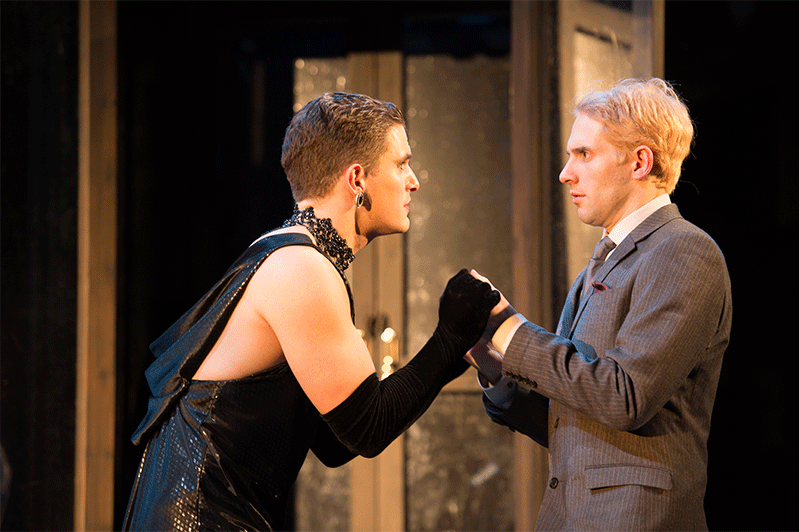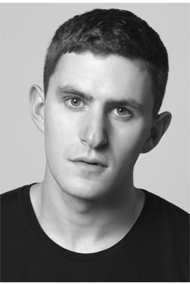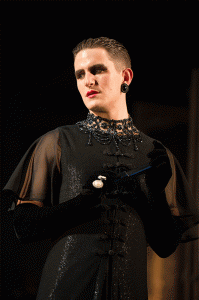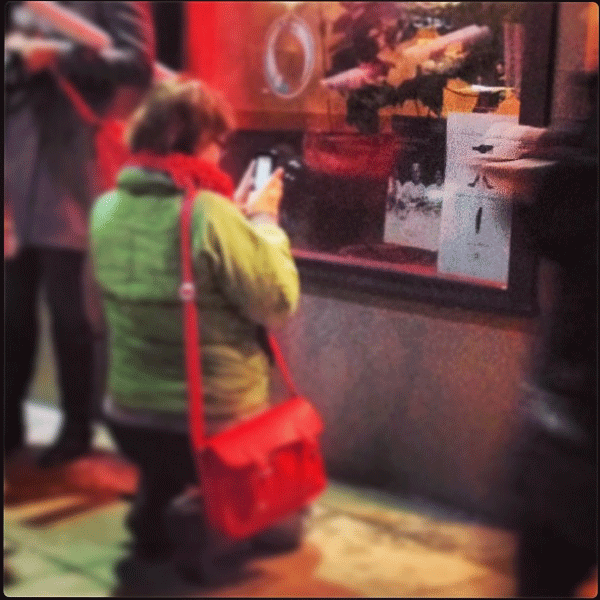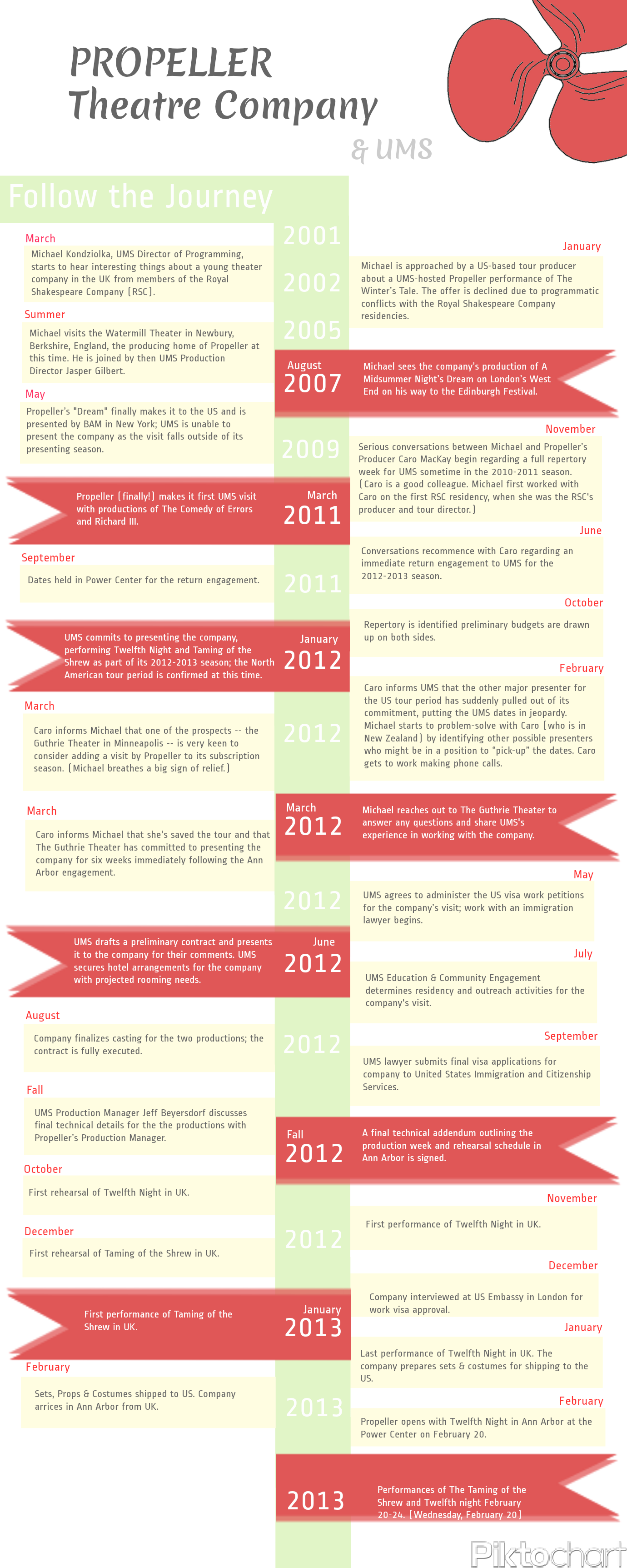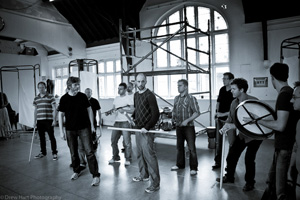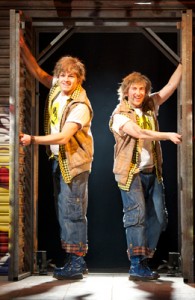Tweet Seats: Propeller
For our third tweet seats event, we saw Propeller Theater Company’s Twelfth Night at Power Center.
UMS: Tell us a little about you. If you have an online presence you like to share publicly, please tell us the relevant websites or user names/handles.
Annette Smith: Independent thinker, small furry creature lover, amateur photographer, lifelong learner, automotive marketing executive. Proud graduate of Chicago and Michigan. Find me @bluepersiancat on Twitter.
Hannah Mahalak: My name is Hannah Mahalak. I go to Chelsea High School as a Senior and plan to attend Belmont University in Nashville, Tennessee next year. Currently I am involved in the high-school show choir, Company C, and also the Varsity Swim Team. I am @ha_m24 on Twitter.
Nisreen Salka: My name is Nisreen Salka and I am a freshman at the University of Michigan Ann Arbor, studying Business Administration (Marketing) with a minor in Screen Arts and Cultures. I enjoy photography, writing, reading, and socializing with friends. I am very passionate about everything I do, and throw my heart and soul into my every endeavor. I am @Nizzi_Salka on Twitter.
Jasmine Hentschel: My relationship with UMS started back in my sophomore year at U of M, when I started interning in the production department. It was one of the most enriching, enlightening, and greatest learning experiences not only of my undergraduate career, but of my entire life. I currently work for Cambridge Michigan Language Assessments making standardized English language tests, and I’m headed to U of M’s School of Information to study computational linguistics in the fall. @JasmineShuree on Twitter.
UMS: In one sentence, how would you describe your relationship with technology?
Annette Smith: Love/hate. Still remember my first computer and discovering the internet…I didn’t sleep for two weeks, it was like the door to a magical whole new world had opened to me, and I couldn’t get enough. I also fell in love the first time I saw a flat screen television, but was too practical to buy one at $12K. The “hate” part comes having to figure out how to work/use the new stuff, and oftentimes getting frustrated while I’m doing this.
Hannah Mahalak: I would say I am pretty tech-savvy. I have a smart phone, so I tend to keep up with the latest and greatest trends and news updates.
Nisreen Salka: I believe that technology is an essential part of daily life; I use my iPhone, laptop, and camera every day to finish academic work, schedule appointments, coordinate extracurricular activities, and keep in touch with friends that I haven’t seen in a while.
Jasmine Hentschel: I am wonderfully overwhelmed by the incredible knowledge and power that technological advances of recent decades have afforded people all over the world.
UMS: Why did you decide to participate in this project?
Annette Smith: As someone relatively new to Twitter, I want to take my tweet game to the next level. Blending Twitter with my love of the arts seems like a natural step. I am intrigued by the prospect of being able to share my thoughts, reactions to the performance with others real-time. I’m also interested in how/if others respond. It may be crickets out there. We’ll see!
Hannah Mahalak: I am taking a class at Chelsea [High School] that is a mentorship course with UMS and getting a little taste of each department. I’m trying to get as much experience as I can in the music business and all that goes into it since that’s what I will be studying next year.
Nisreen Salka: Although I love technology as a whole, I have never jumped onto the social media bandwagon. I suppose I always thought it was some sort of fad, a waste of time, or a superficial way to gather information and/or keep in touch. It has recently dawned on me, however, that maybe social media has some merit, and I decided it was about time that I tried it. I want to see if it would really interfere with my life in a negative way, or actually improve my understanding of the world around me in the same way the rest of technology does. I would also like to see the impact it has on my understanding of the performance.
Jasmine Hentschel: I think UMS is an incredible organization that really brings a great deal of phenomenal art and culture to the vibrant city of Ann Arbor. Having worked as an intern for several years in the production department, I’ve been to dozens and dozens of UMS shows and I thought this would be an exciting new way to get involved. I am very curious to see how it feels to be engaged in the performance in a totally different way.
UMS: To you, what does it mean to “be present” during a performance or another arts experience?
Annette Smith: This is a tough one to put in words, but to me I think this means to be engaged in the artistic experience with my heart as well as my mind. When I’m “present”, I am 100% engaged. Every word/note/movement is heightened. Sometimes, I can actually feel the performance. To be honest, it’s easiest for me to “be present” at musical performances, where I close my eyes, and just focus on the sounds and how they make me feel. And when I finally feel that first frisson, I know I’m there.
Hannah Mahalak: To “Be Present” is a lot more than just sitting in the audience. I believe that you need to try and look for a deeper meaning to each story the performer is trying to convey. The more you invest into the performance the more you can get out of it.
Nisreen Salka: Being present in a performance means watching the performance attentively, understanding what is happening on stage, and connecting with the performers themselves.
Jasmine Hentschel: Being “present” is a matter of being engaged in a performance and giving it all of your consideration and attention, regardless of your preconceived notions and expectations of what it might be. It’s about not only noticing the little things, including all of the time and effort that gets put into every aspect of a performance, but also how it makes you feel before, during and after, and how you the art you’re watching ties into and relates to your personal experiences and those of all of mankind, whether it be theater, dance, music, or some other art form.
Meet the tweets.
How did tweeting affect your experience of the performance?
Annette Smith: I had to take my eyes off stage to tweet, so missed seeing a few things, but still felt like I heard everything. Tweet seat location – at back of the balcony – was not ideal. I could not really see facial expressions, costume details, etc. It’s a little tight and cramped having all of the tweeters (twitterers?) sitting side by side with the black boxes on our laps. Not unbearable, but there definitely wasn’t much space to move or stretch.
Hannah Mahalak: I really enjoyed the tweet seat experience. It made me pay attention to the play more and stay focused. It was a really unique and innovative way to get the word out about the performances and the UMS organization.
Nisreen Salka: Tweeting during the performance allowed me to express my opinions about the performance without speaking, and therefore without annoying others who were fully immersed in the play. It also encouraged me to think more about the purpose of the play, almost to critique it, rather than just follow the narrative. I was able to think more about the artistic merit of the performers, express those opinions to other interested viewers, and read their responses. Exposure to other viewers’ opinions also encouraged me to notice aspects of the performance that I wouldn’t have otherwise.
Jasmine Hentschel: This was my first tweet seats experience, and it was definitely a little more difficult than I had expected. I think it would have been much different had it been a musical performance, because with music you can still hear and feel the music, even if you’re looking down at your phone. With Twelfth Night, I had difficulty getting adjusted to the language at first, and was completely unfamiliar with this particular play. I had a hard time trying to tweet during the performance at first because I had to completely stop paying attention and look down at my phone. It was a matter of removing myself from the very personal and introspective experience of watching, experiencing, and processing the play and changing my mindset to think about how to express my thoughts and opinions to a public audience. You have to not only carefully consider your thoughts, but also how to phrase them in a way that will make sense to other people. You have to use your brainpower to focus on minor things like spelling, grammar, and how to make your thoughts make sense that otherwise would never be crossing your mind during a performance.
Taylor Davis: I enjoyed that not only could I tweet my thoughts and experience, but through following the #umslobby hashtag I could communicate and interact by others.
Did you expect this effect or are you surprised by this outcome?
Annette Smith: I expected having to take my eyes off stage to tweet – no way around this. Since I was expecting this, it didn’t really bother me. The location of the seats was a surprise. To get the maximum visual experience of live theater, the back of the balcony is almost the last place you want to be. I didn’t expect the “tight” feeling from all of us sitting together. But we adjusted. After intermission, some of the tweet participants either exited or moved, freeing up space, and making it much more comfortable.
Nisreen Salka: I did expect to consider the performance more carefully, but I did not expect the strong effect of other viewers’ responses. At times, the tweets followed almost like a conversation, with questions and answers, and at others the tweets formed a list of comments. Both formats encouraged me to notice aspects of the performance I wouldn’t have otherwise, and to consider those elements when I tweeted again.
Hannah Mahalak: Yes, I expected to pay more attention to the play and get really involved in the play and each character.
Jasmine Hentschel: I definitely expected some sense of disconnect just considering the nature of the gig. However, like I said, I think I didn’t totally take into account the fact that doing this for a musical performance and a play is a totally different thing. It was a little harder than I anticipated, but I think it definitely would’ve been easier if I had been more familiar with the play ahead of time!
Taylor Davis: I was surprised by how much I really enjoyed interacting with others. At first, I was nervous that I didn’t really have anything that I considered “tweet worthy” and that my twitter followers would enjoy and interact with. However, as the performance progressed, I was able to see what other people were saying through following the #umslobby hashtag. Once I was able to read their tweets and see their interactions, I tailored my tweets to join in the conversation.
What I found the most surprising was that I had two friends text me that the next time I go to a UMS event they want to come with. I also had someone respond to my tweet asking where I was, which is kind of a cool grassroots and authentic way that UMS can further their marketing.
Curious to try it? Sign up.
We have over 100 teenagers here…
“We have over 100 teenagers here, ready to see Shakespeare, and we’re very excited about it.”
We love that over 100 teens came to see Propeller’s Shakespeare performances this weekend with the Early College Alliance at Eastern Michigan University. See more comments from Propeller Theatre Company’s visit to Ann Arbor.
Propeller Blog: Behind the Scenes
Editor’s Note: Propeller performs Twelfth Night and The Taming of the Shrew in Ann Arbor, February 20-23. Leslie Stainton covered the company’s last visit to Ann Arbor in 2011 with Richard III. This post is a part of a series.
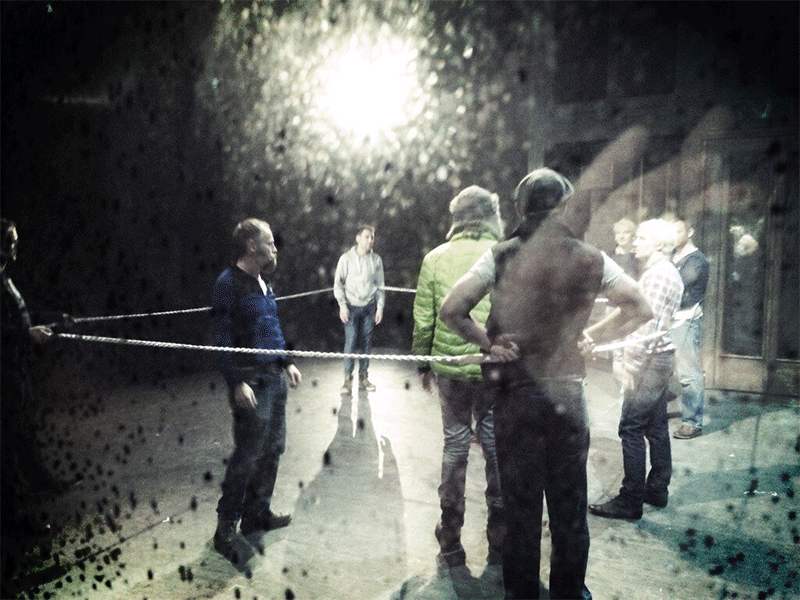
Photo: Actor Ben Allen took this photo inside the set.
From a Friday afternoon session with Nick Ferguson, production manager for Propeller, and U-M production and design students, these behind-the-scenes tidbits:
All of this had me marveling, again, at the audacity of touring. Propeller’s next U.S. venue is the Guthrie Theater in Minneapolis, where the big challenge will be maneuvering its towering wardrobes and chest of drawers up and down a thrust stage. Good thing they’re in Ferguson’s hands—he’s been working backstage in the theater since he was 17. Now “an old man,” by his account, he loves his work. “You never stop learning,” he says. “Especially in the theater.”
Propeller Blog: The Actor’s Freedom
Editor’s Note: Propeller performs Twelfth Night and The Taming of the Shrew in Ann Arbor, February 20-23. Leslie Stainton covered the company’s last visit to Ann Arbor in 2011 with Richard III. This post is a part of a series.
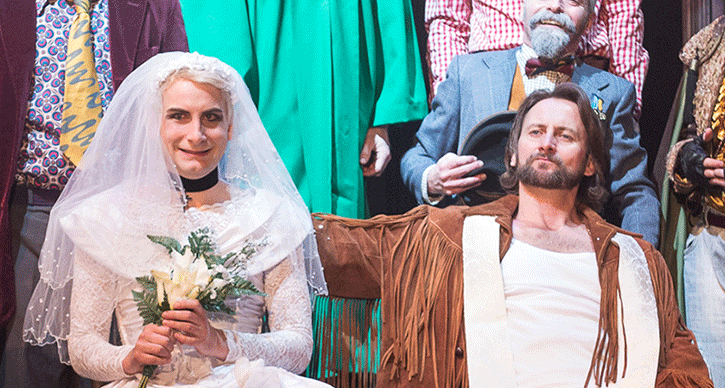
Photo: The Taming of The Shrew. Photo by Manuel Harlan.
I’ll confess up front I’d never seen Taming of the Shrew before. Never even read it. I had some gauzy idea—probably from Kiss Me Kate—that it was a happily-ever-after story about an ideally matched couple who couldn’t figure out they were meant for each other until they’d sparred around for two hours and wound up kissing.
I now know—or suspect—the reason I didn’t know the show is because it doesn’t get done all that much. And that’s because, like Merchant of Venice, it deals with things that make us very, very, very uncomfortable.
One of the first questions asked at the post-show Q&A last night: “Was it a comedy tonight?”
Answer, from a cast member: “The funniest thing about it is how stupid the men in the play are.”
In a book I return to regularly, The Actor’s Freedom, critic Michael Goldman argues that one reason we need theater is because of the actor’s freedom to handle “fearful materials…While on stage, the actor enjoys a kind of omnipotence, a privilege and protection not unlike that accorded sacred beings—whatever he is doing, whatever crimes he may appear to commit, he is not to be interfered with.”
You see Goldman’s idea played out to magnificent effect in this bracing, brutal show about domestic violence, staged as a play within a play—a merciful choice, as it turns out, because it releases us from what would otherwise be unbearable. (I dare anyone to smile at the show’s climactic image of Kate, as broken dog.)
Not that Propeller’s Shrew doesn’t have its moments of wild comedy or brilliant color or hip-thrusting ’70s tunes. But my guess is that’s not the part you’ll remember most. In the same week we marked the 50th anniversary of Betty Friedan’s Feminine Mystique, this production reminds us that Kate’s experience of spousal abuse is neither unique nor obsolete—as a number of cast members pointed out after last night’s show. Here’s Benjamin O’Mahoney (Grumio and Pedant) [start at 4:25 for related comment]:
Last night, as I watched actors play characters who were in turn playing characters, I realized again how vital this process is if we’re to confront and understand our basest selves. Identity is the “covert theme of drama,” Michael Goldman suggests. The fact that with Propeller, you’re seeing actors who played someone entirely different the night before only deepens the experience.
It’s a rare pleasure to see actors in rep like this, and to remember that this is how the theater once worked. Companies spent months on the road, traveling from town to town (we’ve got an old road house down the road from us in Adrian), switching roles nightly or sometimes twice in a day, layering roles upon roles. A huge nod of gratitude to Propeller for reviving the tradition and reminding us of the theater’s liberating powers.
Propeller Blog: Hauntings
Editor’s Note: Propeller performs Twelfth Night and The Taming of the Shrew in Ann Arbor, February 20-23. Leslie Stainton covered the company’s last visit to Ann Arbor in 2011 with Richard III. This post is a part of a series.
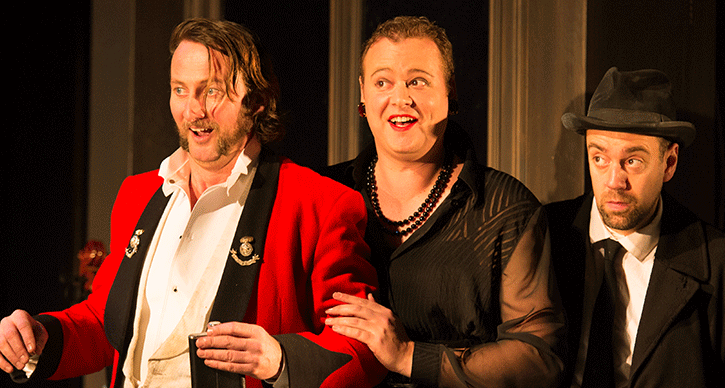
Photo: Twelfth Night. Photo by Manuel Harlan.
“Everything in the theatre, the bodies, the materials utilized, the language, the space itself, is now and has always been haunted, and that haunting has been an essential part of the theatre’s meaning to and reception by its audiences in all times and all places.” —Marvin Carlson, The Haunted Stage: The Theatre as Memory Machine
Among the ghosts I detected onstage Wednesday night—images and actions that reminded me of the last time I saw this company at work, here in Ann Arbor in 2011—were:
- Music—not recorded but performed onstage by the ensemble on an eclectic range of instruments, among them cello, clarinet, sax, bongo, wine glass and balloon
- Acoustic sound—no miked voices, thank god
- Chorus—the company is, for the most part, onstage throughout the show, donning half-masks to function collectively as both witnesses of and ghostly participants in the story
- Men playing women—I’d forgotten the unsettling pleasure of watching one gender impersonate the other (and, in the case of Viola-Cesario, male playing female playing male); this is how Shakespeare meant his plays to be seen, and while I don’t always love it, there is, as one actor said in last night’s post-show talkback, a “layering” that speaks to the ways we each layer ourselves in guises
- A quality of low-tech and handmade—of course this isn’t literally true (the show is designed and lit and costumed within an inch of its life), but you get the sensation this troupe of players has rather spontaneously come together on a platform to tell you a story, and they’re going to do it by hand, converting wardrobes into rooms, turning a chest of drawers on its side to function as a bar, picking up whatever musical instrument is at hand, grabbing costumes and props from a clothing rack, creating bird song with their own voices, acting out a tale as if they were kids in a playroom making their toys talk
- Syringe—remember Richard III with its sinister band of nurses? It came back in a flash last night when Sir Toby Belch produced a giant syringe to sedate Malvolio
There’s another way in which this production of Twelfth Night reminded me of Propeller’s last visit, and that’s the way it seemed to blend both previous productions—the somber, monochromatic Richard III and the zany Comedy of Errors—into a single show, at once monochromatic and zany. I’ve never seen a darker Twelfth Night, or a bleaker take on any Shakespeare comedy. Picture a score of actors, almost all of them in black, on a gray stage with sepia furnishings against a thundery sky. I kept waiting for unadulterated comedy to erupt from this gloomy space, and of course it did, but mostly in quick, jabbing bursts, and always with an edge.
And that’s as it should be, said actor Joseph Chance (Viola-Cesario) during last night’s post-show talkback. “There’s a lot of violence behind the play,” Chance told the hundred or so audience members who’d stayed behind to discuss the production with cast members. (I recommend it—and I’m not a big fan of talkbacks. There’s a second one tonight after Shrew.)
Malvolio’s humiliation is hilarious but also deeply cruel, Chance went on. It’s painful to behold. The ending of the comedy is not wholly sweet. Chance said he thinks this all “has a lot to do with Shakespeare’s ability to last through the years. He doesn’t pander.” The play is not unabashedly romantic, nor is it purely tragic—like life, it’s a mingling of both. When characters wonder if they’re going mad, they’re not being cute. There’s a real chance they are—and we literally hear that madness as it threatens to envelop them.
Here’s what assistant director George Ransley has to say about all this:
Caro McKay told me the other day that Shrew was the darker of the two plays on offer at Power. Now that I’ve seen Twelfth Night, I’m wondering how that’ll play out onstage. All I know is what actor Ben Allen said last night: “This show is monochrome. Shrew is disco lights like you’ve never had. It’s like drinking 10 espressos.”
Back in Town, and Loving It
Editor’s Note: Propeller performs Twelfth Night and The Taming of the Shrew in Ann Arbor, February 20-23. Leslie Stainton covered the company’s last visit to Ann Arbor in 2011 with Richard III. In this interview, Leslie chats with Propeller’s executive producer Caro McKay.
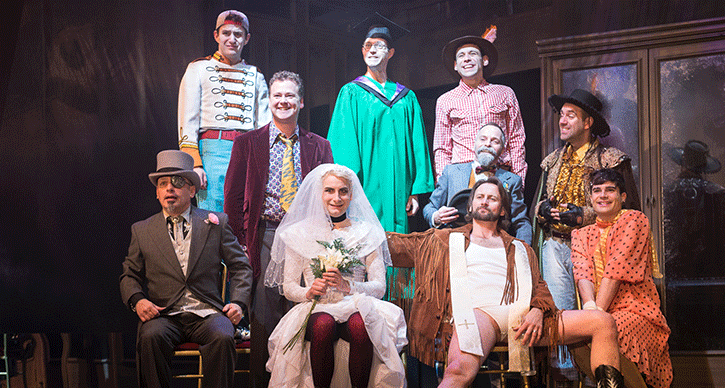
Photo: The Taming of The Shrew. Photo by Manual Harlan.
Caro McKay has been around the theater long enough to call herself “a dinosaur.” Now the executive producer of Propeller, she managed the English-language tour of the Peter Brook’s iconic Mahabarata back in the 1980s—a production students now learn about in performance studies classes, as McKay discovered to her surprise when she visited a class in U-M’s School of Music, Theatre, and Dance yesterday.
McKay’s been to Ann Arbor twice before—first with the venerable Royal Shakespeare Company nearly a decade ago, and then in 2011 with Propeller, the rambunctious, unpredictable, musically minded all-male troupe she launched a few years ago with the director Edward Hall. They’re all back in A2 this week with a pair of Shakespeare plays McKay says complement one another in dizzying ways—“because one is so harsh on love and marriage, and the other is so life-affirming about it.”
While crews were unpacking sets and focusing lights in the Power Center late yesterday afternoon, McKay took time to field a few questions by phone from her hotel room.
Leslie Stainton: What’s the best part about coming back to Ann Arbor?
Caro McKay: It’s the people. It really is. UMS is a fantastic host. And we’ve thoroughly enjoyed playing to the audiences. American audiences are very vocal. You let us know if you find it amusing or shocking. You tell us, and English audiences are rather restrained. It’s such a joy to have that interaction.
LS: What’s especially challenging about these two shows, Twelfth Night and Taming of the Shrew?
CM: Shrew is very funny but also very painful—there are very few kind words in that show. It’s the shorter, tighter, harsher of the two plays. For me it just passes in a moment, really. It’s riveting. And to follow up with Twelfth Night, which is a beautifully balanced bit of love with melancholy and humor—and also its own viciousness.
LS: Anything in particular we should be looking for in either play?
CM: Both shows are full of music. That’s very particular to Propeller, the way the actors are active musicians. I think there will be a lot for people to enjoy. I should just say very quietly that Act Two of Twelfth Night starts with a little bit of a tap dance routine.
LS: What about the sets?
CM: This time we’ve come back with a set that is shared between both productions, using wardrobes that you can walk into, out of, swing around. One wardrobe opens and has an organ. There’s an enormous great chandelier that is used in both plays. Twelfth Night can be quite black and white when we start in the beginning, in court, in this rather miserable little place … and then the color comes into it through the play.
LS: Are there certain moments where you’re especially curious to see how audiences react?
CM: I’m wondering how they will respond to the wedding in Shrew. So we’ll just wait and see what comments that might bring in. And to Petruchio and his servant. And I think the audience for Twelfth Night will enjoy the box tree scene—when Malvolio gets the letter to read. I think that is done in a rather different way. I’m very much looking forward to the comments. It was a rather lively debate last time.
What’s next in the Propeller pipeline?
CM: Our next two shows are Midsummer Night’s Dream and The Comedy of Errors. Popular titles. We’re building our audiences. Because a year after that, from the autumn of 2014 to 2015 we’re going to produce our history cycle. So we’re consolidating audiences, and then we’re going to sock ’em with a whole load of history. (Laughs.) Five plays, and we’ve decided that our version of the history cycle will include Edward III, which is attributed to Shakespeare.
LS: Any chance we’ll get to see it in Ann Arbor?
CM: We’d be so proud to. But I’m very very aware that Ann Arbor has had the RSC history plays! We would be only too proud—we love coming here already.
Propeller’s Ben Allen on playing women in Shakespeare
Editor’s Note: Propeller performs Twelfth Night and The Taming of the Shrew in Ann Arbor, February 20-23. The company was last in Ann Arbor in 2011 with Richard III. In this excerpt, actor Ben Allen talks about playing women in Shakespeare & more. Read the complete piece here.
Being part of Propeller, you often gets asked, “What’s it like playing a woman?” or “How do you approach playing a woman?” It seems to be a subject that many people are interested in, whether from an acting perspective, from a political perspective, or simply out of curiosity. In post-show discussions we are able to give brief answers to these questions but I thought it would be interesting to go into a bit more detail.
The idea of Propeller being an all male company is not something our artistic director Ed Hall deliberately set out to do. It all started with a production of Henry V at the Watermill Theatre in Newbury in the nineties, where Ed had the idea of telling the story through a chorus of twentieth century male soldiers – an idea that was revisited in our production of Henry last year. This initial production was a huge success and so Ed asked that company if they wanted to do another one. All actors who were in that first production were asked back to do the next production, something which Propeller continue to do to this day.
A lot of people I speak to about Propeller say, “Oh, so you’re doing it the traditional way” by this referring to the fact that in Shakespeare’s time, all the parts were played by men. While I can see what they mean, we’re not aiming to replicate that. From what we know the female parts would have been played by teenaged boys, whose voices had not yet broken, rather than fully grown men. By having men playing women we are making the audience complicit in the theatricality of the piece and the storytelling, rather than trying to make them believe what they are seeing is “real.” This high jump of the imagination makes for a highly rewarding experience, both for the audience and indeed the actors.
I am in my second year with Propeller now and have played two women over the four plays I have done: Perdita in The Winter’s Tale last year and Olivia in Twelfth Night this year. Olivia is a grieving countess, having recently lost her brother and father, yet arguably the highest status person in the play, who ruthlessly speaks her mind and commands attention, frequently demanding what she wants and putting down those around her in the blink of an eye. My motivations, vocal language and physical language are usually very different depending on who it is I am playing.
Olivia
If I’m to be specific then, I can share a bit of my ongoing experience creating the character of Olivia, since this is the part I am currently playing.
It is fair to say that my process of creating this character is roughly the same as with any character, be it male or female. I carried on to make four lists: the facts about my character; things she says about herself; things she says about other people, and things other people say about her. For example, we can safely assume that it is a fact that her brother and father have both recently died, we also know she is a woman, and that she is a countess. She says Malvolio is “sick of self love”, yet also says “I would not have him miscarry for the half of my dowry”. She is called “cruelty” by both Viola and Orsino, and Maria says Olivia will hang Feste for his absence from the house. These are just a few examples of clues within the text, which one ends up weaving together to create the basic foundations of the character.
One can also look at the form of Olivia’s words as they are on the page; she starts off the play speaking in prose, indicating perhaps a rational and emotionally disconnected state of mind. It is only towards the end of her first meeting with Viola, disguised as Cesario when she starts speaking in verse, which tells us something has changed within her! By looking closely at the text and mining out the clues within it, one can create a basic skeletal structure, which helps to plot the character’s journey through the play.
Something that playing a woman often requires is great change in physicality. It is a refreshing challenge for me, especially in a world where typecasting is becoming more and more prevalent. People often imagine it to be very difficult for men to inhabit more feminine qualities and vice versa, yet I think it mostly comes down to a question of the individual’s willingness to embrace the opposite sex within them. I am a firm believer that we are made up of both masculine and feminine aspects.
People ask if we spend time observing the way women move and so on, but I don’t really feel the need to do that as I’ve been doing it my entire life! I feel the key to really inhabiting this physicality is to root everything in the character’s inner life, history and desires and to try and be as specific as possible. Generalized “woman acting” would just be pretty crass I think, so one needs to be careful to think precisely about what kind of woman one is playing.
During the rehearsal process, I developed a detailed mental picture of how Olivia would look, move, speak and so on. I used plenty of specific personal references to build up this picture. This could be anything from women I have randomly encountered to friends or colleagues to characters from films. I made sure I had a rehearsal skirt to wear and I got my heels early in rehearsals, as wearing these things really do influence the way you move around – it’s much harder to go fast in heels! These kinds of abstract character references allow your imagination to take you off somewhere you can find all sorts of new things to try out.
All in all I find playing a woman extremely liberating
In terms of voice, I am not trying to exactly replicate a particular woman’s voice, something which I think would only act as a barrier between myself and the character, and in turn the audience and my character. Instead I aim to suggest a female voice by shifting the resonance higher up in my body. As a consequence of this the voice does become generally higher, but I remain connected to it and it still has the potential to drop down in tone and resonate from different areas. It is ultimately about finding a character voice that you can inhabit as fully as your own voice, once this happens you can go in any direction you want to go in and in turn make all sorts of discoveries.
All in all I find playing a woman extremely liberating. There is something so exciting about playing a character who is such a different entity to you. I count myself lucky to have had the opportunity to do this in such a wonderfully supportive company, especially in a world where many directors and casting directors understandably won’t cast you outside of your type because they can’t take the risk that you will be able to achieve the end result within the time frame of the project.
Many might ask, what is the validity of having men playing women?
As I write this I am aware of that fact that men playing women in the theatre has been the cause of much debate. Many might ask, what is the validity of having men playing women? Why not have women in this company? I personally cannot give formal answers to these questions but I hope that it is through such productions as ours, the recent all male productions of Twelfth Night and Richard III out of the Globe and the all female Julius Caesar at the Donmar, that audiences can grow to appreciate gender-blind casting. Surely by doing this we could potentially open up those hundreds of fantastic male parts in the classical repertoire for women to play.
In addition to this we need to encourage more female (and male) playwrights and directors to create work about women and for women. Hopefully by gaining more female work we can gain some kind of gender balance and I would much rather that than preventing more male-orientated work from existing or policing the arts and telling people what they can and cannot do. As a company we should be free as artists to put on the work we feel compelled to make, and as long as there are audiences willing to come and see us, I think we will be doing it for quite some time to come.
Ben Allen and Propeller perform Twelfth Night and The Taming of the Shrew at the Power Center in Ann Arbor February 20-23.
Spotted at Sava’s: Visitor takes photo of our Propeller poster
We also can’t wait for English accents, tomfoolery & iambic pentameter. Propeller is in Ann Arbor next week, February 20-24.
Infographic: Propeller’s Journey to Ann Arbor
Propeller perform Twelfth Night and The Taming of the Shrew in Ann Arbor February 20-23. But, how did the company get here? We asked our production team to put together a timeline of all the adventures on the way. Take a look.
Click on the image to zoom in a little closer.
In Closing, An Open Letter to Propeller Theater Company
I will be frank with you: I was hoping to have my world rocked when I walked into your shows this week. I’d heard so much about you, lectures and my brother and my professor and the you tube trailers and the information on the UMS website. You seemed like just the type of company for me. And let me tell you, you fulfilled all of my twenty-two-year-old drama-English-music-geek dreams. You are a company of talented, passionate, dedicated, vocally gifted, really good looking men who make Shakespeare into something brand new while somehow getting closer to the root and core of the text than any production I’ve ever seen.
In short, I wanted my world to be rocked. And rocked it was.
But, see, I’m not all that important. And it’s not because I’m young. It’s not because I’m not a big theater critic, or I’m not some CEO who can fund you. God willing, one day I’ll have the swag to fund the arts the way I think they should be funded. I’m unimportant because you didn’t have to win me over. I already love Shakespeare.
What makes YOU really important Propeller, is not that I, a lover, was rocked. What makes you important is that all the people who are lukewarm about Shakespeare, or don’t know Shakespeare, or who just downright don’t LIKE Shakespeare, are suddenly curious.
I’ve rarely seen an Ann Arbor audience so receptive to pure slapstick and tomfoolery. We’re a stuffy liberal town generally, mixed in with the conservative elements from the surrounding areas who come in for the shows and the restaurants. But there they all sat, two older women in front of me enjoying the performance just as much as I was, as much as my mother (in from the suburbs of Detroit) was, as much as the two women who were sitting next to me speaking in French during the intermission, as much as the younger men with their dates in the front row who got pulled into the action.
Oh I’m sure some people walked out in the middle of the performances insulted, or rolled their eyes, or thought the naked man with a sparkler up his rear was just tasteless. But those, I think, were much fewer and farther between than those of us who absolutely loved what you were doing up on that stage.
Because really, it’s not everyone who can take a piece of history and make it live again. It’s not every company that can keep an audience so riveted that they watch you perform in the lobby at intermission as well as on the stage for two hours. It’s not just anybody who can take a play centuries old and plant it in our heads like it just happened, like we just heard this news, this story, today.
I already love Shakespeare, and it was obvious when I watched the shows you presented. But what was really extraordinary was that I didn’t feel alone in my unashamed and vocal enjoyment of the show. I felt, for one of the very few times in my life as an audience member, as essential to the show as the company was. And as much a part of the group of the audience, as you are Propeller, within your incredibly close knit company.
There are few things more beautiful than watching people around me discover Shakespeare. My own aunts were asking me their questions at intermission and pronounced the production “wild,” at the close, wishing they had been able to see Richard as well.
Which is exactly as it should be Propeller – they should all want more when they leave. Like any brilliant piece of art, they should still be thinking, feeling, reacting, after they walk out the door. It should stick with them. Haunt them like Richard, make them smile like Comedy, explore some part of their humanity like Shakespeare always always does. Anyone who sees this production is thinking, Propeller, where have you been all my life, for I ne’er saw true Shakespeare till this night!?
And that is simply beautiful. There will always be Shakespeare lovers like me. But many of those people who saw you this week will be thinking about Shakespeare in an entirely new way. That is something incredible.
So, my dear Propeller, take this as a open invitation from Ann Arbor. We send our love, our appreciation, and above all our gratitude. A good theater company is hard to find, but you certainly fit the bill. It was an absolute pleasure to have you. Now, come back soon, hear?
Sincerely,
Jen Leija (blogger and adamant fan)
What’s next for Propeller?
We were sitting in the Power Center late yesterday afternoon, watching the changeover from Richard III to Comedy of Errors, and Caro MacKay, executive producer of Propeller, was talking about the shift from Richard’s stark black/white and blood-red world to the trash-strewn, gaily lit, exuberant world of Comedy. “We’re putting some color in the set now,” she said, as stagehands hoisted a panel of graffiti-sprayed shingling onto the big rock ’n roll truss that frames both productions.
MacKay said the idea behind Propeller’s environment for Comedy is “what we call ‘British lager louts.’ A Costa del Sol vacation, where Brits wear silly hats and spend the day drinking lager and hanging around the beach.” She chuckled. “Costa del Ephesus!”
This afternoon was your last chance to visit—at least in Ann Arbor. (The company will do a six-week run at Boston University’s Huntington Theater later this spring.)
A few behind-the-scenes tidbits:
· It’s not a stretch to think of the chorus members as hooligans—soccer fans (witness the jerseys) whooping it up far from home.
· The setting itself is a piazza in the 1980s, a period “quite close to us and probably the height of all this silliness,” MacKay said.
· Designer Michael Pavelka came up with the design of the graffiti himself, then hired a crew of real graffiti artists to render it. But before they agreed to lift a spray can, they made Pavelka swear it was his own design—it’s part of their code of honor not to copy another graffiti artist’s work.
MacKay talked briefly about what’s ahead for Propeller after its international tour of Richard III and Comedy of Errors winds up in August. While here in A2, Propeller received the welcome news that it had received three years’ funding from the British Arts Council—“which means we’re good for four more years,” MacKay said. “We can breathe.” (The news was bittersweet, though, as it came coupled with the announcement that 206 other British arts organizations had received no funding. Many would be forced to close.)
Propeller will reconvene in September and start work on next year’s touring shows, still to be determined. “There’s always one play Ed wants to do,” MacKay said of director Edward Hall. “He struggles a bit to find the other.”
Once they’ve picked the shows, Hall and Pavelka will come up with a set that works for both and begin rehearsals. The 14 members of the current company will get first-refusal rights for the next troupe. It’s a key part of the way this most democratic of theater companies works.
Sometime in the future, Hall wants to do his own cycle of the Shakespeare history plays—the three Henry VIs, Henry V, and Richard III. The working title is Blood Line. MacKay says they’re not sure when they’ll do it, “but we’re working toward it.”
A2 audiences who reveled in the RSC’s first residency here back in 2001—which gave us the three Henry VIs and Richard III—may find this news as tantalizing as I do. UMS, are you listening?
Propeller: Was There a Doctor in the House?

You bet. In fact, there were no fewer than 35 of them at Friday night’s performance of Richard III—med students and house officers, all part of the UM Medical Arts Program, a joint UMS–UM Medical School initiative designed to enrich physician training through exposure to the arts and humanities. Funded by the Doris Duke Foundation, the program gives UM medical students and house officers (aka residents) an inside take on concerts, plays, art exhibitions, poetry readings, and so on—all in an effort to deepen their understanding of the human beings they’ll be caring for as physicians.
Joel Howell, professor of internal medicine at UM and co-director of the program, sent this report on the group’s involvement with Propeller:
Last Wednesday evening some 35 medical students and house officers gathered at A2’s Blue Nile Restaurant to enjoy food, drink, and a stimulating discussion of Richard III—the person and the play. Guided by two splendid Shakespeare experts—UM English Professor Barbara Hodgdon and Carol Rutter of the University of Warwick—the group used the play as the starting point to discuss everything from the roots of Richard III’s behavior, to his choice for future matrimony, to what it must be like to confront death. Along the way the discussion was enlivened by images and quotations from the play.
Two nights later the same group attended Richard. Three reactions:
The amazing thing is not so much the production’s obvious connection with a hospital setting, but the holistic way we should be looking at people. It’s very easy for people in medicine to separate themselves from patients. These events underline that we’re all the same.
It was also nice to see that hospital gowns had backs to them. —Sonali Palchaudhuri, third-year UM medical student
I’m doing a rotation in psychiatry now, and I was thinking about how difficult it would be to diagnose Richard, because he’s such a complex character. Any art is a sharp critique of the boundaries and categories we have in psychiatry. —Eunice Yu, third-year UM medical student
Richard III helps to draw into relief how many people outside the medical world see the hospital setting as creepy and scary. The use of masks [in the production] is in sync with that. I thought of how I have to garb when I go into the operating room or the ICU—how that separates us and makes both doctors and patients feel less human. —John Rhyner, house officer
Propeller: In an Age of Tweets and txts, Musical Signposts
I’m seeing Richard III again today and wish I could do the same for Comedy. I want to catch and somehow memorize all the glorious, intricate, how-the-hell-did-they-do-that details of these two mind-bending productions. I’ve rarely seen a company that so exhaustively squeezes the meaning from a single line of text. Watch Richard Frame dissect and reconstruct and almost literally sculpt Dromio’s pun-packed speech about a spherical wench (in Comedy) if you want to see what I mean.
If you’ve seen either production, you’ll know that music—liturgical, folk, rock, mariachi, tango, rap—underscores and illuminates and just as often undercuts the action onstage. The company describes Richard III as a Requiem Mass, and while I wouldn’t say it’s quite that (though there’s plenty of spilled blood for the literally Mass-minded), it’s far more musical than any Richard I can remember seeing. The production opens with a somber Pie Jesu that lets you hear the gorgeous voices director Ed Hall has assembled in this miraculous little company. (I’m told at least one cast member is a former King’s College choirboy, but he’s far from the only actor with serious vocal chops.)
The Pie Jesu is a perfect example of the egalitarian and deeply collaborative way this company works. The actors went off by themselves, learned and prepared the piece (sung a cappella, like so much of their work), and brought it to Hall. (“Oh, we got to show this to Ed!” actor Chris Myles, who plays Buckingham, remembers thinking.)
Hall was blown away. The piece felt right and quickly found its way into the opening beat of the production, where it sets the tone for everything that follows—all the sacrificial blood-letting, the keening widows and inconsolable mothers, the great dirge that is this play.
“That domino at the very beginning was a great stroke of luck,” Hall said yesterday in a Brown Bag panel at UM’s Lane Hall. “If you get that right, all the other dominoes fall where they should.”
The cast creates a musical soundscape for every show they do—and it’s not just music but offstage sound effects (wind, sirens, horse hooves) and helpful pings that accompany the mention of particular characters (Richmond) or props (the gold chain in Comedy). It’s yet another way Propeller helps audiences who inhabit an age of Tweets and txts navigate the syntactical thicket of Elizabethan English.
With music and sound, as with virtually everything else in these shows, actors do most of the work. They prepare and perform songs, shift sets (all those sinister screens in Richard), deliver props, learn each other’s roles (so that anyone can step in for almost anyone in a pinch). As one company member told me, “If we have a problem to solve, we don’t go for the technological solution.” That’s a huge part of what makes these productions so fun. We’re all—actors and audience—using our imaginations in ways we seldom get to do.
Chris Myles said yesterday that the demands on Propeller actors are so enormous he gets “offstage fright” instead of stage fright. “When I’m onstage and my character’s in a scene, I’m fine. But offstage, I’m changing costumes, delivering props, chanting Latin. There’s always something I know I’m bound to be doing.”
Often it’s singing. Unaccompanied or accompanied by the simplest of instruments—a handheld drum, a wooden stick—the human voice is on magical display here. Hall says music is a deeply “informative” part of Propeller’s work. In the very first rehearsals, when the cast is just sitting around a table reading the script, they’ll talk about where they might want to include musical moments and debate the style of music that might work best in the production. “We spend half our time on YouTube listening to stuff.”
Happily, for another 24 or so hours, audiences in Ann Arbor don’t have to resort to YouTube. We’ve got the real thing.
Tossing Grenades At Shakespeare, and other lessons from Propeller Director Ed Hall
 All week long I’ve been hearing people sing the praises of Propeller director Ed Hall. In rehearsals he’s decisive but incredibly open to ideas, firm but flexible, actors say. Company manager Nick Chesterfield told me Hall is “incredibly inclusive. Ed has a very loose way of working, in that he knows what he wants, but he doesn’t lay it on the show. I’ve never experienced a more generous environment.”
All week long I’ve been hearing people sing the praises of Propeller director Ed Hall. In rehearsals he’s decisive but incredibly open to ideas, firm but flexible, actors say. Company manager Nick Chesterfield told me Hall is “incredibly inclusive. Ed has a very loose way of working, in that he knows what he wants, but he doesn’t lay it on the show. I’ve never experienced a more generous environment.”
Having now seen Hall up close, in a riveting exchange Thursday morning with a dozen or so BFA directing students from the UM School of Music, Theatre, and Dance, I get what everyone means. Tidily dressed in a blue Oxford-cloth shirt and slacks—and looking more like a businessman on casual Friday than the director of one of Britain’s most explosive theater companies—Hall spent nearly two hours talking with students and members of the UM theater faculty and gamely fielding questions. He was affable and engaging, and the students clearly gleaned a lot from the exchange. As did I.
About the playwright with whom he’s most closely associated, Hall confessed, “If I go more than 18 months without directing Shakespeare, I go through withdrawal.”
About building a scene: “The opposite is always true. If you have a scene where two people love each other, you have to find out what obstacles they have to overcome in order to love one another.” Ditto with a scene in which two people profess to hate each other—find out what draws them together. “That’s the source of the tension, the drama.”
When directing Shakespeare, Hall often starts with the toughest scene. “If you want to do something big, get it in early.”
On directorial control: “Have a plan, but be critically prepared to let it go out the window. Give yourself up to the process of rehearsal. It’s like stepping off a cliff—if you don’t do it, the actors won’t do it. But they have to know you’re going to be there to catch them. It’s an enormous paradox—trying to control something you’re essentially letting go of.”
Much of what Hall said helped explain the great inventiveness I saw onstage in both Richard III and Comedy of Errors, whose wit and sheer physical brawn had Thursday night’s audience literally oohing and ahhing throughout the evening. Earlier in the day Hall told the UM student directors, “The more I retreat [as a director], the greater the party is onstage.” And oh, what a party.
Now in his mid-40s, Hall has directed 14 productions of Shakespeare. The first, Othello, defeated him. Hall said he tiptoed around the play, trying to do it “right,” and quickly learned his lesson. He now throws “as many grenades as possible against the notion of directing Shakespeare.” That’s not to say he’s not fiercely thoughtful about the texts—as evidenced by these razor-smart productions—but experience has taught him there’s not much to gain from reverence. Hall decries “sunset” acting—where performers look off into the distance with misty eyes while intoning the great lines (“Now is the winter …”). Says Hall: “As a director, you have a duty to cast off the burden of those lines.”
A few more observations that help illuminate the process behind the provocative shows now playing in A2:
“Shakespeare didn’t do scene changes. The moment you do a piece of design that requires the play to stop, you lose momentum.”
“The chorus is context. The context changes and evolves as you rehearse.”
“Acting Shakespeare, you have to be like a good lawyer—you have to be able to deliver rhetoric.”
“There’s no subtext in Shakespeare. The text is where the character is, and the subtext builds itself up from the text.”
“The rehearsal room is a temple for the people you’re working with. It’s a safe place. It’s a private place.”
“The more mistakes you make in rehearsal, and the faster you make them, the quicker you get to the truth. It’s all in the doing.”
And, for the audience, in the going. Go.
Richard III Recap: Taking Sides
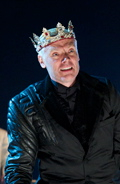 We generally do not side with the homicidal maniacs of a given story. For example, we may see Iago’s point of view in Othello, but in the end, after all he does to ruin the lives of those around him, do we really feel all that sorry for his arrest and eventual torture?
We generally do not side with the homicidal maniacs of a given story. For example, we may see Iago’s point of view in Othello, but in the end, after all he does to ruin the lives of those around him, do we really feel all that sorry for his arrest and eventual torture?WITH VIDEO: Sex, Blood, & Body Bags: “Richard III” Opens at Power Center
Nick Chesterfield, Propeller’s company manager, has a soft spot for the Power Center. It was here, in Dressing Room A, where in 2003, during the RSC’s run of Salman Rushdie’s Midnight’s Children, Nick learned that his wife, then 26 weeks pregnant, was going to give birth to a son. That boy is now seven years old and already showing a proclivity for the theatrical life, his dad says proudly. “He likes to stay up late.”
Nick is back in town this week with Propeller and happy to be here. By comparison to the RSC, his former employer, he says Propeller is “tiny”—just 14 ensemble members, a handful of stage managers and technicians, and no real home to speak of. “When we don’t have a show we don’t have a company. Our office is where we are. Our theater is where we are. The work is where we are.”
Right now that’s in the Power Center, where an appropriately powerful Richard III—full of blood and plenty of gore, but also, surprisingly and happily, quite a lot of laughs—opened last night. “It’s bloody, but it’s bloody with a twinkle,” Nick told me a couple of hours before the show, moments after the company had finished a long cue-to-cue rehearsal.
While technicians checked sound levels, secured the stage floor, and adjusted lights for the evening performance—Richard’s American debut—Nick talked about the production and the completely seductive way Richard worms his way into audience’s hearts. “You like him, and you’re horrified and repelled by him. He’s horrific but sexy at the same time.” Nick says he’s always interested in seeing how people react to Shakespeare’s most notorious king—and by the way they respond to the show’s considerable violence. Crowds in Edinburgh and Barcelona relished it. Nick was curious to see how the citizens of Ann Arbor would react (see the video below).
I guessed Nick could tell me a few details about the gore we see onstage in this ghoulish, oh-so-delicious show, and I was right. Here are three details to—dare I say?—savor:
- Intestines. Specially created for this production, they’re made of sausage casings stuffed with Readybrek—an instant oatmeal, very powdery, which looks like “gray gruel,” Nick says. Coat them with blood, and you’ve got Buckingham’s bowels.
- Blood. It’s washable, edible, nontoxic, and comes in three thicknesses, including arterial and veinous. Propeller goes through pints of it with every show.
- Body bags. They’re “quite spooky” backstage, especially if you stumble over them, and the company buys them by the dozen. An unsettling revelation: “We’ve discovered they’re not as robust as we’d thought.”
And the chain saw? Here’s everything you need to know:


